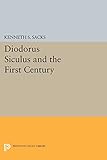Diodorus Siculus and the First Century / Kenneth S. Sacks.
Material type: TextSeries: Princeton Legacy Library ; 1109Publisher: Princeton, NJ : Princeton University Press, [2014]Copyright date: ©1990Edition: Course BookDescription: 1 online resource (256 p.)Content type:
TextSeries: Princeton Legacy Library ; 1109Publisher: Princeton, NJ : Princeton University Press, [2014]Copyright date: ©1990Edition: Course BookDescription: 1 online resource (256 p.)Content type: - 9780691600345
- 9781400861286
- 930 23
- online - DeGruyter
- Issued also in print.
| Item type | Current library | Call number | URL | Status | Notes | Barcode | |
|---|---|---|---|---|---|---|---|
 eBook
eBook
|
Biblioteca "Angelicum" Pont. Univ. S.Tommaso d'Aquino Nuvola online | online - DeGruyter (Browse shelf(Opens below)) | Online access | Not for loan (Accesso limitato) | Accesso per gli utenti autorizzati / Access for authorized users | (dgr)9781400861286 |
Browsing Biblioteca "Angelicum" Pont. Univ. S.Tommaso d'Aquino shelves, Shelving location: Nuvola online Close shelf browser (Hides shelf browser)

|

|

|

|

|

|

|
||
| online - DeGruyter Culture and Identity : Japanese Intellectuals during the Interwar Years / | online - DeGruyter Princetonians, 1784-1790 : A Biographical Dictionary / | online - DeGruyter Princetonians, 1791-1794 : A Biographical Dictionary / | online - DeGruyter Diodorus Siculus and the First Century / | online - DeGruyter Lucretius on Death and Anxiety : Poetry and Philosophy in DE RERUM NATURA / | online - DeGruyter The Iconography of the Sarcophagus of Junius Bassus : Neofitus Iit Ad Deum / | online - DeGruyter Studies on the Origin of Harmonic Tonality / |
Frontmatter -- CONTENTS -- ACKNOWLEDGMENTS -- ABBREVIATIONS -- INTRODUCTION: The Argument -- CHAPTER ONE. Prooemia -- CHAPTER TWO. Themes in Historical Causality -- CHAPTER THREE. Culture's Progress -- CHAPTER FOUR. Aspects of History Writing -- CHAPTER FIVE. Diodorus on Rome -- CHAPTER SIX. Diodorus in the World of Caesar and Octavian -- CONCLUSIONS -- APPENDIX ONE. Sicilian Enfranchisement -- APPENDIX TWO. Posidonius on Italian Knights -- BIBLIOGRAPHY -- INDEX OF SIGNIFICANT PASSAGES IN DIODORUS -- INDEX OF SIGNIFICANT PASSAGES IN OTHER AUTHORS -- INDEX OF SIGNIFICANT GREEK TERMS -- GENERAL INDEX
restricted access online access with authorization star
http://purl.org/coar/access_right/c_16ec
Living in Rome during the last years of the Republic, Diodorus of Sicily produced the most expansive history of the ancient world that has survived from antiquity--the Bibliotheke. Whereas Diodorus himself has been commonly seen as a "mere copyist" of earlier historical traditions, Kenneth Sacks explores the complexity of his work to reveal a historian with a distinct point of view indicative of his times.Sacks focuses on three areas of Diodorus's history writing: methods of organization and style, broad historical and philosophical themes, and political sentiments. Throughout, Diodorus introduced his own ideas or refashioned those found in his sources. In particular, his negative reaction to Roman imperial rule helps to illuminate the obscure tradition of opposition historiography and to explain the shape and structure of the Bibliotheke. Viewed as a unified work reflecting the intellectual and political beliefs of the late Hellenistic period, the Bibliotheke will become an important source for interpreting first-century moral, political, and intellectual values.Originally published in 1990.The Princeton Legacy Library uses the latest print-on-demand technology to again make available previously out-of-print books from the distinguished backlist of Princeton University Press. These editions preserve the original texts of these important books while presenting them in durable paperback and hardcover editions. The goal of the Princeton Legacy Library is to vastly increase access to the rich scholarly heritage found in the thousands of books published by Princeton University Press since its founding in 1905.
Issued also in print.
Mode of access: Internet via World Wide Web.
In English.
Description based on online resource; title from PDF title page (publisher's Web site, viewed 30. Aug 2021)


